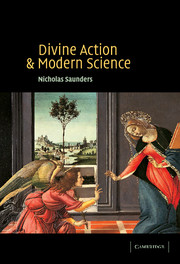Book contents
- Frontmatter
- Contents
- Preface
- Chapter 1 Motivations
- Chapter 2 Theological approaches to divine action
- Chapter 3 The laws of nature and miracles
- Chapter 4 Determinism and SDA
- Chapter 5 Divine action and quantum theory
- Chapter 6 Does God cheat at dice?
- Chapter 7 Chaos Theory and divine action
- Chapter 8 Whole–part models of SDA
- Chapter 9 Is SDA really tenable?
- References
- Index
Chapter 7 - Chaos Theory and divine action
Published online by Cambridge University Press: 02 December 2009
- Frontmatter
- Contents
- Preface
- Chapter 1 Motivations
- Chapter 2 Theological approaches to divine action
- Chapter 3 The laws of nature and miracles
- Chapter 4 Determinism and SDA
- Chapter 5 Divine action and quantum theory
- Chapter 6 Does God cheat at dice?
- Chapter 7 Chaos Theory and divine action
- Chapter 8 Whole–part models of SDA
- Chapter 9 Is SDA really tenable?
- References
- Index
Summary
The recent ‘discovery’ of chaos theory owes a huge debt to the development of the computer. It is in essence a mathematical phenomenon, much of which had been developed by Henri Poincaré and was known for almost a hundred years. Chaos theory is consequently quite unlike quantum theory or relativity in that it introduces no new postulates about the workings of the universe. In the previous chapter we considered the projection postulate and the Schrödinger equation, neither of which is a feature of classical mechanics. In chaos theory, however, there are simply no parallels to these and the models used in the theory are generally a construct of classical physics described in a basically Newtonian manner. This fact has been well drawn out by Theodor Leiber:
Physical chaos research does, however, not constitute a new research programme, or a novel theory of physics: The theoretical core (or negative heuristic) is still constituted by the axioms and theorems of classical mechanics … [this] has led to a certain ‘renaissance’ of classical mechanics by emphasizing the (general and possibly unifying) question of (algorithmic, effective) computability of dynamic systems.
(Leiber 1998, 367)The central issue in relation to chaos theory that Leiber identifies is the computability or predictability of dynamical systems. As we shall see, the issue of determinism in chaos theory is more complex than many scientist-theologians have acknowledged, and especially as it has been applied in the context of claims for the existence of chaotic SDA.
Information
- Type
- Chapter
- Information
- Divine Action and Modern Science , pp. 173 - 206Publisher: Cambridge University PressPrint publication year: 2002
